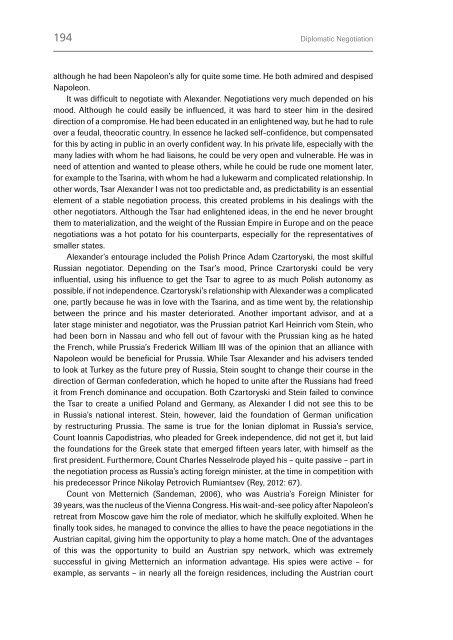Diplomatic Negotiation
Diplomatic_Negotiation_Web_2015
Diplomatic_Negotiation_Web_2015
You also want an ePaper? Increase the reach of your titles
YUMPU automatically turns print PDFs into web optimized ePapers that Google loves.
194 <strong>Diplomatic</strong> <strong>Negotiation</strong><br />
although he had been Napoleon’s ally for quite some time. He both admired and despised<br />
Napoleon.<br />
It was difficult to negotiate with Alexander. <strong>Negotiation</strong>s very much depended on his<br />
mood. Although he could easily be influenced, it was hard to steer him in the desired<br />
direction of a compromise. He had been educated in an enlightened way, but he had to rule<br />
over a feudal, theocratic country. In essence he lacked self-confidence, but compensated<br />
for this by acting in public in an overly confident way. In his private life, especially with the<br />
many ladies with whom he had liaisons, he could be very open and vulnerable. He was in<br />
need of attention and wanted to please others, while he could be rude one moment later,<br />
for example to the Tsarina, with whom he had a lukewarm and complicated relationship. In<br />
other words, Tsar Alexander I was not too predictable and, as predictability is an essential<br />
element of a stable negotiation process, this created problems in his dealings with the<br />
other negotiators. Although the Tsar had enlightened ideas, in the end he never brought<br />
them to materialization, and the weight of the Russian Empire in Europe and on the peace<br />
negotiations was a hot potato for his counterparts, especially for the representatives of<br />
smaller states.<br />
Alexander’s entourage included the Polish Prince Adam Czartoryski, the most skilful<br />
Russian negotiator. Depending on the Tsar’s mood, Prince Czartoryski could be very<br />
influential, using his influence to get the Tsar to agree to as much Polish autonomy as<br />
possible, if not independence. Czartoryski’s relationship with Alexander was a complicated<br />
one, partly because he was in love with the Tsarina, and as time went by, the relationship<br />
between the prince and his master deteriorated. Another important advisor, and at a<br />
later stage minister and negotiator, was the Prussian patriot Karl Heinrich vom Stein, who<br />
had been born in Nassau and who fell out of favour with the Prussian king as he hated<br />
the French, while Prussia’s Frederick William III was of the opinion that an alliance with<br />
Napoleon would be beneficial for Prussia. While Tsar Alexander and his advisers tended<br />
to look at Turkey as the future prey of Russia, Stein sought to change their course in the<br />
direction of German confederation, which he hoped to unite after the Russians had freed<br />
it from French dominance and occupation. Both Czartoryski and Stein failed to convince<br />
the Tsar to create a unified Poland and Germany, as Alexander I did not see this to be<br />
in Russia’s national interest. Stein, however, laid the foundation of German unification<br />
by restructuring Prussia. The same is true for the Ionian diplomat in Russia’s service,<br />
Count Ioannis Capodistrias, who pleaded for Greek independence, did not get it, but laid<br />
the foundations for the Greek state that emerged fifteen years later, with himself as the<br />
first president. Furthermore, Count Charles Nesselrode played his – quite passive – part in<br />
the negotiation process as Russia’s acting foreign minister, at the time in competition with<br />
his predecessor Prince Nikolay Petrovich Rumiantsev (Rey, 2012: 67).<br />
Count von Metternich (Sandeman, 2006), who was Austria’s Foreign Minister for<br />
39 years, was the nucleus of the Vienna Congress. His wait-and-see policy after Napoleon’s<br />
retreat from Moscow gave him the role of mediator, which he skilfully exploited. When he<br />
finally took sides, he managed to convince the allies to have the peace negotiations in the<br />
Austrian capital, giving him the opportunity to play a home match. One of the advantages<br />
of this was the opportunity to build an Austrian spy network, which was extremely<br />
successful in giving Metternich an information advantage. His spies were active – for<br />
example, as servants – in nearly all the foreign residences, including the Austrian court


